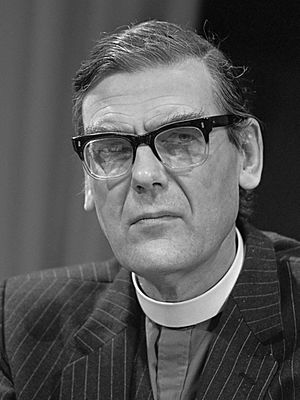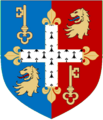John Habgood facts for kids
Quick facts for kids The Right Reverend and Right Honourable The Lord Habgood PC |
|
|---|---|
| Archbishop of York | |

Habgood in 1981
|
|
| Province | Province of York |
| Diocese | Diocese of York |
| Enthroned | 18 November 1983 |
| Reign ended | 1995 |
| Predecessor | Stuart Blanch |
| Successor | David Hope |
| Other posts | Bishop of Durham (1973–1983) |
| Orders | |
| Ordination | 1954 |
| Consecration | 1973 |
| Personal details | |
| Birth name | John Stapylton Habgood |
| Born | 23 June 1927 |
| Died | 6 March 2019 (aged 91) |
| Denomination | Anglican |
John Stapylton Habgood, Baron Habgood (23 June 1927 – 6 March 2019) was an important leader in the Church of England. He was a bishop and later became the Archbishop of York. This is a very senior role in the church. He also served in the House of Lords, which is part of the UK's Parliament. He was known for his work in both the church and in politics.
Contents
Early Life and Education
John Habgood was born on 23 June 1927. His father was Dr. Arthur Henry Habgood. John went to Eton College, which is a famous school. He then studied at King's College, Cambridge and Ripon College Cuddesdon.
Before joining the church, he worked as a university demonstrator in pharmacology. This means he helped teach about medicines and how they affect the body. He became a Fellow at King's College, Cambridge, in 1952.
In 1961, John Habgood married Rosalie Mary Anne Boston. They had four children together: two daughters and two sons. One of his sons, Francis Habgood, later became a Chief Constable of Thames Valley Police.
Church Ministry and Leadership
John Habgood was ordained, or officially became a minister, in the Church of England in 1954. He first served as a deacon and then as a priest in 1955.
- From 1954 to 1956, he was a curate at St Mary Abbots Church in London. A curate is a junior priest who helps in a church.
- From 1956 to 1962, he was the Vice-Principal of Westcott House, Cambridge, which is a college that trains church leaders.
- From 1962 to 1967, he was the Rector of St John's Church in Jedburgh. A rector is the main priest in charge of a church.
- In 1967, he became the Principal of Queen's College, Edgbaston, another college for training church leaders. He stayed there until he became a bishop.
In 1973, he was made a bishop and became the Bishop of Durham. This was an important step in his church career.
Archbishop of York
On 18 November 1983, John Habgood became the Archbishop of York. This is the second most senior position in the Church of England, after the Archbishop of Canterbury. As an archbishop, he also became a Privy Counsellor. This is a group of important advisors to the Queen.
As Archbishop of York, Habgood played a key role in the church. He helped keep different groups within the Anglican church together. This was during a time when there were disagreements about whether women should be allowed to become priests.
He believed that God is neither male nor female. Because of this, he supported the idea of allowing women to become priests. However, he also understood that some people in the church disagreed. To help everyone stay in the church, he introduced a system where bishops could provide special care to those who found it hard to accept women priests.
John Habgood retired as Archbishop of York in August 1995.
Considering the Top Church Role
In 1990, when the Archbishop of Canterbury, Robert Runcie, announced his retirement, John Habgood was considered a possible successor. The Archbishop of Canterbury is the most senior leader in the Church of England.
Some people thought he was the best church leader of his time. Habgood himself said he was interested if the church and God truly wanted him in that role. However, he also felt he might be getting too old for such a demanding job.
In the end, George Carey, the Bishop of Bath and Wells, was chosen as the new Archbishop of Canterbury. Habgood said that Carey was "a good choice." He also admitted that while a small part of him liked the idea of the top job, he didn't truly want it. He felt he was slowing down and that the job was very tiring.
Serving in the House of Lords
From 1973, when he became Bishop of Durham, until his retirement as Archbishop of York in 1995, John Habgood was a member of the House of Lords. This is because senior bishops in the Church of England automatically get a seat in the Lords as Lords Spiritual.
In the House of Lords, he voted against a law called Section 28 in 1988. This law stopped local councils from "promoting homosexuality" and schools from teaching that "homosexuality" was acceptable. This law was later removed in 2000 and 2003.
After he retired as Archbishop in 1995, he was given a special title called Baron Habgood. This allowed him to continue serving in the House of Lords as a Lord Temporal. He sat as a "crossbencher," meaning he did not belong to any political party.
Later in his life, he stopped attending the House of Lords. In 2011, he was one of the first people to officially retire from being a member of the Lords.
Religion and Science
John Habgood was very interested in the relationship between religion and science. He was a member and past president of The Science and Religion Forum. This group discusses how faith and scientific discoveries can fit together.
He wrote several books and articles on this topic. One of his books was called Truths in Tension: New Perspectives on Religion and Science (1965). He also wrote about how different religious views, like creationism, relate to science.
Books Written by John Habgood
- Religion and Science (1964)
- A Working Faith (1980)
- Church and Nation in a Secular Age (1983)
- Confessions of a Conservative Liberal (1988)
- Making Sense (1993)
- Faith and Uncertainty (1997)
- Being a Person (1998)
- Varieties of Unbelief (2000)
- The Concept of Nature (2002)
Images for kids
 | Victor J. Glover |
 | Yvonne Cagle |
 | Jeanette Epps |
 | Bernard A. Harris Jr. |



